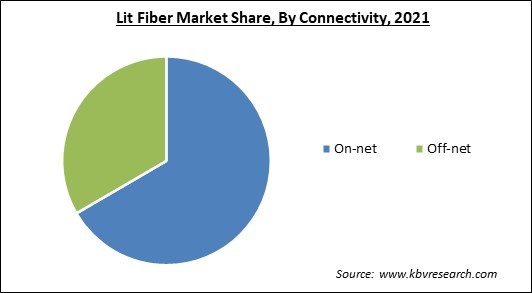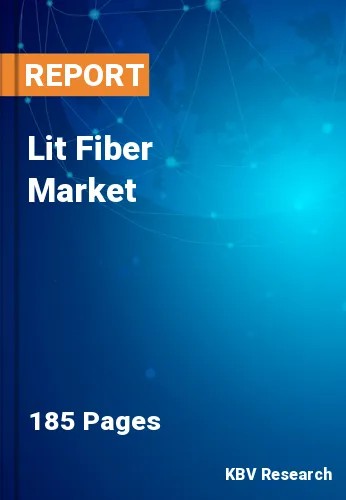The Global Lit Fiber Market size is expected to reach $8.9 billion by 2028, rising at a market growth of 15.8% CAGR during the forecast period.
Lit fiber is a live fiber-optic network that sends data through small strands of fiber optic cable. The demand for lit fiber has risen in response to the rapid development of internet bandwidth and the widespread availability of internet services over time. Businesses that rely significantly on the internet are strong advocates of the market. Reduced network scalability, latency, dependability, and increased security are all advantages of these networks for enterprises with a significant volume of data flow.

These connections are not linked to any optical equipment and are only present to be utilized at a subsequent time. It is also known as a customer-owned or service-provider-owned new fiber construction project. Network service vendors are leasing these idle fiber-optic lines in the current market. The telecommunications business was expanding in the late 1990s, and a significant amount of money was invested into establishing these fiber-optic networks. During that time, fiber networks, as well as motorways and rail lines, were aggressively laid out. A thousand miles of the regional or local network was also established throughout major cities and population centers.
A fiber-optic system that is not in operation currently is referred to dark fiber. While the fiber optics in lit fiber networks have light pulses constantly streaming through them and conveying data, the cables in dark fiber networks have no light pulses traveling through them and are mostly idle. Dark fiber networks, like lit fiber networks, are frequently controlled by service providers that lay optical fibers into the ground to construct them. However, neither the service provider nor anyone else is currently using these dark fiber networks.
The lit fiber market witnessed rapid growth during the COVID-19 pandemic. During the outbreak, various companies adopted remote working cultures, which bolstered the demand for high bandwidth internet connectivity. As a result, the adoption of lit fiber all over the world flourished. In addition, companies are restructuring their operations and recuperating from the COVID-19 impact, which had previously resulted in stringent containment measures, such as social distancing and the shutdown of commercial activities, all of which created operational issues. The efforts of businesses in order to recover from the impact of the pandemic would lead the market to several major growth prospects in the coming years. Hence, the COVID-19 pandemic laded a positive impact on the lit fiber industry.
The internet is a worldwide network of interconnected devices. Fiber optics constitute as the internet's foundation, with optical fibers serving as the medium for transmitting data from one source to another. In recent years, a significant proportion of the world's population used the internet. The number of internet users is also increasing rapidly. The use of the internet is being driven by the rising importance of data transfer and storage, cloud computing, and IoT. The number of internet users is estimated to rise at a fast pace in the coming years with the growing number of businesses and individuals shifting to cloud spaces for several operations.
Any broadband service architecture that employs lit fiber as the optical medium to carry data in a local loop for last-mile telecommunications is known as FTTx. FTTH, FTTB, FTTP, FTTN, and FTTC are all examples of FTTx. Because of its ability to support bigger bandwidth at faster speeds, lit fiber has become a crucial component for network evolution. Communication applications are continuously growing in number, and each one has features that necessitate more bandwidth and speed. Video technology, OTT, and IoT are examples of sophisticated applications. As the use of these applications grows, more network topologies, such as FTTH and FTTB, are required. The most bandwidth is consumed by video technologies.

Fiber is more vulnerable to mechanical or physical damage than other metal wirings since it is lighter and thinner. When building renovations are underway, fiber optic cables can be easily cut or broken by accident, and even a single cut on the cable can cause significant disruption. It's crucial to consider this before the deployment to avoid any kind of damage to the cable. Moreover, lit fiber is costly to install. The user would also need specialized equipment to make sure that the connection is working properly, as well as the suitable personnel to set up the fiber optics equipment. The complete process of installing lit fiber can lead the user to a significant final cost.
Based on Type, the market is segmented into Multi-mode and Single-mode. In 2021, the multimode segment procured the largest revenue share of the lit fiber market. The growth of this segment is significantly rising due to the fact that this method of transmission is most appropriate for short distances. It's mostly utilized in video surveillance as well as LAN (Local Area Network) networks. Over many light modes, multi-mode cables may readily transfer several light beams with increased attenuation and less brightness.
Based on Connectivity, the market is segmented into On-net and Off-net. In 2021, the off-net segment registered a substantial revenue share of the lit fiber market. It basically consists of a solution provider that, through a supplier agreement, rents a connection at a local area network facility. For example, while traveling on a roaming network, a user connects to customers connected to different network providers using their home network.
Based on Application, the market is segmented into Networking, Aerospace & Defense, IT & Telecommunication, Industrial, and Others. In 2021, the networking segment witnessed the highest revenue share of the lit fiber market. The increasing adoption of lit fiber in this sector is attributed to the increasing demand for high-speed connectivity in this industry. Data is transmitted at a faster rate via lit fiber connections than over copper wires. Cloud-based apps, data-intensive applications, and high-bandwidth infrastructure can all benefit from illuminated fiber.
| Report Attribute | Details |
|---|---|
| Market size value in 2021 | USD 3.2 Billion |
| Market size forecast in 2028 | USD 8.9 Billion |
| Base Year | 2021 |
| Historical Period | 2018 to 2020 |
| Forecast Period | 2022 to 2028 |
| Revenue Growth Rate | CAGR of 15.8% from 2022 to 2028 |
| Number of Pages | 185 |
| Number of Tables | 349 |
| Report coverage | Market Trends, Revenue Estimation and Forecast, Segmentation Analysis, Regional and Country Breakdown, Companies Strategic Developments, Company Profiling |
| Segments covered | Type, Connectivity, Application, Region |
| Country scope | US, Canada, Mexico, Germany, UK, France, Russia, Spain, Italy, China, Japan, India, South Korea, Singapore, Malaysia, Brazil, Argentina, UAE, Saudi Arabia, South Africa, Nigeria |
| Growth Drivers |
|
| Restraints |
|
Based on Regions, the market is segmented into North America, Europe, Asia Pacific, and Latin America, Middle East & Africa. In 2021, Asia Pacific held a substantial revenue share of the lit fiber market. The factors driving growth in this region are the increasing number of technological advancements with widespread usage of technology in the IT, telecommunications, and administrative sectors. Furthermore, the strong penetration of lit fiber cables in the industrial, aerospace, and defense sectors throughout Asia-Pacific is augmenting the growth of the regional market.
Free Valuable Insights: Global Lit Fiber Market size to reach USD 8.9 Billion by 2028
The market research report covers the analysis of key stake holders of the market. Key companies profiled in the report include AT&T, Inc., Verizon Communications, Inc., Comcast Corporation, Zayo Group, LLC (EQT Partners Digital Colony), Charter Communications, Inc., Altice USA, Inc., Crown Castle International Corp., Frontier Communications Corporation, and GigabitNow (IsoFusion).
By Type
By Connectivity
By Application
By Geography
The global lit fiber market size is expected to reach $8.9 billion by 2028.
Growing utilization of the internet all over the world are driving the market in coming years, however, More fragile and expensive limited the growth of the market.
AT&T, Inc., Verizon Communications, Inc., Comcast Corporation, Zayo Group, LLC (EQT Partners Digital Colony), Charter Communications, Inc., Altice USA, Inc., Crown Castle International Corp., Frontier Communications Corporation, and GigabitNow (IsoFusion).
The expected CAGR of the lit fiber market is 15.8% from 2022 to 2028.
The North America market dominated the Global Lit Fiber Market by Region in 2021, and would continue to be a dominant market till 2028; thereby, achieving a market value of $3,133.7 Million by 2028.
The On-net segment is leading the Global Lit Fiber Market by Connectivity in 2021, thereby, achieving a market value of $5.52 billion by 2028.
Our team of dedicated experts can provide you with attractive expansion opportunities for your business.

